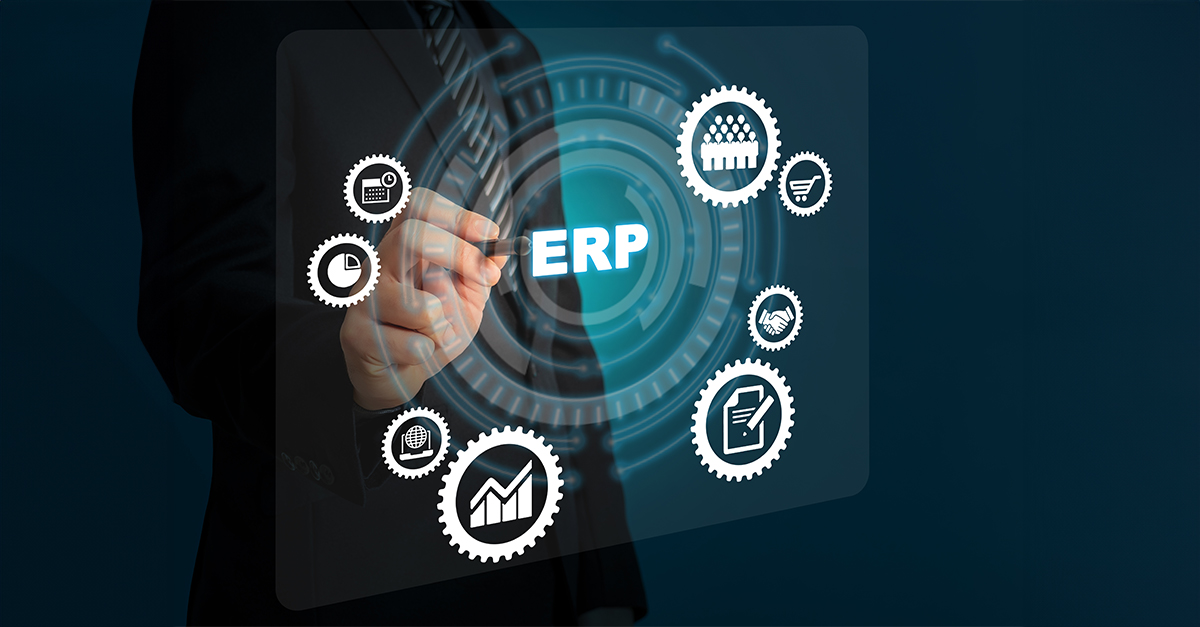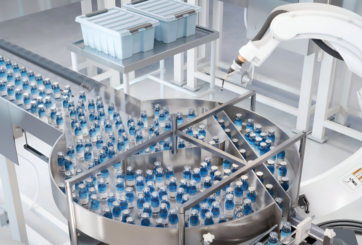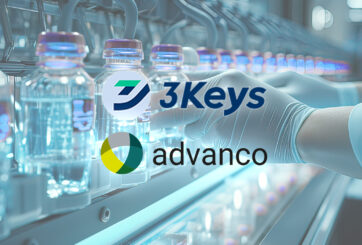Integrating Serialization with Enterprise Resource Planning (ERP) Systems
Enterprise Resource Planning (ERP) systems – already entrenched within the pharmaceutical sector – will soon become synonymous with it.

This is because if a pharmaceutical manufacturer is not already using an ERP system, it soon will be. It has become a must-have requirement, thanks to its ability to coordinate multiple, moving components in real-time, extending to components unique to the pharma sector.
Thanks to this almost wholesale adoption, it is imperative that pharmaceutical vendors and suppliers, including serialization providers, can communicate with, and work alongside, ERP systems. A failure to do so will mean that, at best, a major revenue stream is lost – and at worst, they could be forced out of business.
Let us look at the importance of ERP systems – and how existing solutions, such as advanco’s SAP Adapter, can provide seamless integration between serialization solutions and ERP systems. With no direct link between manufacturing equipment and ERP systems, the industry is becoming increasingly reliant on the innovation of companies such as advanco which are providing a much-needed way of connecting serialization and ERP systems.
What is an ERP system and why are they so vital for pharma?
An Enterprise Resource Planning (ERP) system is a comprehensive software solution designed to manage and integrate the core business processes within a pharmaceutical company. This includes everything from procurement and production to distribution and compliance.
ERP systems are indispensable for the pharmaceutical sector due to their ability to manage the complex, regulated, and quality-sensitive nature of the industry. They streamline operations, ensure compliance, enhance quality management, and provide critical real-time data for decision-making, ultimately leading to improved efficiency, reduced costs, and better overall performance. Thanks to the ability of ERP systems to ensure all necessary tasks of a pharma business are met, they are now entrenched as one of the main components of all pharmaceutical firms across the globe.
Examples of pharma ERP systems include SAP S/4HANA, which incorporates a comprehensive suite of applications and strong compliance features; Oracle ERP Cloud which is known for its financial management and supply chain capabilities; and Infor M3, which is tailored specifically for process manufacturing industries, including pharmaceuticals.
Challenges of integration
Seamless communication with ERP systems does not come without challenges.
Typically, there are multiple, complex issues that need to be overcome, chief of which focuses on solving technical incompatibility issues. It is essential to ensure interoperability between serialization solutions and ERP systems, a task which begins right from the outset by addressing integration issues and system compatibility issues.
It is essential that this early task is managed closely – as with many system updates, if done incorrectly it will result in potential disruptions to existing operations. No pharmaceutical producers can risk this, especially when it comes to the production of drugs that are relied upon by people across the globe.
Cost considerations are also an issue. The initial cost of ERP implementation, including software, hardware, and training, can be substantial. Furthermore, implementation can be time-consuming, requiring extensive planning, testing, and validation before going live.
In a data-driven age, data security and privacy concerns are never far away from the thoughts of senior technology staff from pharma firms.
Serialization solutions live or die by the data that they produce. Not only is it essential to ensure all data is watertight and adheres to full regulatory requirements, such as GDPR regulations, maintaining the accuracy and consistency of data over the lifecycle of any relationship between a serialization provider and a pharma firm is critical. Any discrepancies can lead to compliance issues and even jeopardize patient safety.
It is also important to adapt to changes in regulatory requirements and market conditions – and these changes occur regularly. Compliance with stringent regulations such as those from the FDA (Food and Drug Administration) and EMA (European Medicines Agency) requires that ERP systems handle documentation, validation, and reporting accurately. It is also vital to see that the system adheres to Good Practice guidelines (GMP, GLP, GCP) across manufacturing, laboratory, and clinical practices.
Benefits of Integration
Once the challenges of integration with ERP systems have been overcome, what are the benefits of doing so?
From a business operational viewpoint, perhaps one of the main practical benefits is a high level of end-to-end visibility. ERP systems enable the real-time tracking of products from manufacturing to distribution, which leads to enhanced transparency across the supply chain. This, in turn, leads to improved decision-making thanks to the end-to-end traceability of raw materials and finished products, which is critical for quality control and recall management.
Streamlined business processes are also high up on the list of benefits of integration. ERP systems automate and streamline routine functions, reducing the need for manual intervention, thus increasing operational efficiency. They also provide real-time data and analytics, enabling informed decision-making and proactive management.
Enhanced data accuracy is also a welcome result of ERP integration, which provides a single source of truth for all serialization-related data, encouraging consistency and reliability for all data across a business.
These are all business efficiency benefits. However, let us not lose sight of the big-ticket benefits, such as increased ease of adherence to the many, constantly-changes country-specific serialization requirements.
Key Areas of Integration
Integrating an ERP system within the pharmaceutical industry touches several critical areas that are essential for smooth operations, regulatory compliance, and overall business performance.
It fully synchronizes product information, batch details and supplier data, while reducing data redundancy and ensuring data integrity. Furthermore, by fully coordinating production schedules, optimizing resource utilization, and ensuring the timely completion of manufacturing processes, businesses will experience highly streamlined operations.
It also manages batch production, ensures traceability, adheres to compliance with GMP (Good Manufacturing Practices), and efficiently handles raw materials and finished products.
When it comes to shipping orders, real-time updates on the transport status and delivery timelines are provided as required, which ensures serialized products can be accurately documented and traced at every stage of their journey.
ARC SAP ADAPTER – Benefits and integration methods
Advanco’s ARC SAP Adapter allows pharmaceutical firms to benefit from an out-of-the-box, version-agnostic, SAP certified solution. It is fully compatible with the SAP infrastructure, including SAP S/4HANA, establishing a bi-directional flow of information between SAP ERP & SAP ATTP with ARC solutions.
It builds on the success of the previous ARC SAP Connector, which manages product master data, receives packing orders from SAP, and handles accurate sales order registration and processing. The ARC SAP Connector also manages the exchange of serialization data with SAP ATTP and SAP ICH as a Level 4 system.
The new, next-generation ARC SAP Adapter is designed to take the success of the ARC SAP Connector to the next level. An important addition offered by the ARC SAP Adapter is that it acts as a translator, helping different systems communicate to each other, even those that do not use conventional integration methods. By bridging manufacturing equipment with the SAP ecosystem, the adapter significantly enhances operational efficiency.
Furthermore, the ARC SAP Adapter is designed to standardize and secure the connection of all integrated systems, such as packaging lines, ERP and advanco’s ARC Platform. Integrated software is vital for the rapid adherence to quickly changing, mandatory regulatory requirements which are being rapidly adopted across the globe in retaliation to the increasing amount of counterfeit medicine in circulation.
The importance of the ARC SAP Adapter cannot be overstated. As we have seen, it provides an essential way of connecting overall pharmaceutical manufacturing processes with ERP systems. Without it, and products like it, we would see a much more fragmented, much less coordinated serialization function within the overall pharma sector.
Conclusion
Integrating ERP systems with serialization processes in the pharmaceutical industry offers several significant benefits, including enhancing compliance, operational efficiency, and overall supply chain transparency.
However, despite the almost wholesale adoption of ERP systems by the pharma sector, it is vital not to rush a serialization integration programme, which must be done strategically.
It is vital to select a serialization partner with a strong track record of ERP integration, and the tools to drive it. Any mistakes could prove costly – not just when it comes to a pause in production, but also reputational damage which could last a long time into the future.
However, if done properly, integration will prove to deliver multiple business benefits. With the right strategy and the right partner, integration will be a lot more straightforward than you might imagine.
VIEW THE ORIGINAL ARTICLE HERE



